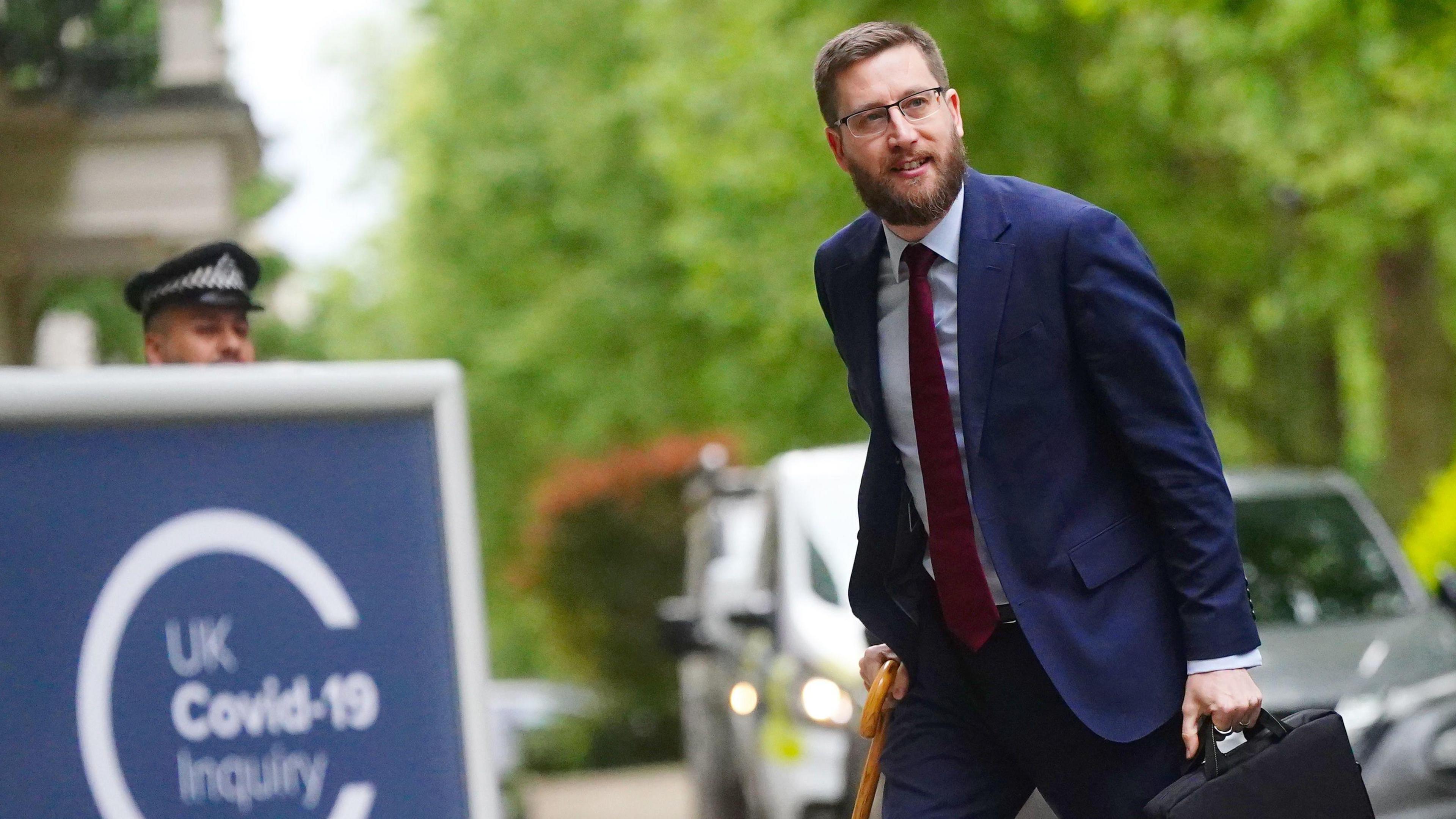Top civil servant sorry for 'raw' Covid messages

- Published
Messages criticising Boris Johnson and Downing Street colleagues were "raw, in-the-moment" expressions and not the reality of the government's pandemic response, the cabinet secretary has told the Covid-19 Inquiry.
Simon Case sent WhatsApps saying Mr Johnson "cannot lead" and calling officials "pygmies" at the height of the pandemic. At the time Mr Case was the prime minister's chief adviser.
Speaking to the Covid inquiry on Thursday, the UK's top civil servant said he "deeply regretted" the messages.
Mr Case's role in the pandemic and subsequent scandals has come under increased scrutiny in the past year.
He was absent from hearings when other senior Westminster figures gave evidence due to medical leave.
Simon Case: 'Keeper of secrets' under scrutiny
- Published3 February 2023
Covid inquiry: The UK pandemic in numbers
- Published5 July 2023
In WhatsApp messages disclosed to the inquiry, Mr Case said:
Boris Johnson, the then prime minister, "cannot lead" and "changes strategic direction every day"
Mr Johnson and "the people he chooses to surround himself with are basically feral"
"I've never seen a bunch of people less well-equipped to run a country" in a message to Mark Sedwill, who was the civil service chief at the time.
Found it "hilarious" that travellers had to isolate in quarantine hotels and had "no sympathy" for airlines going bankrupt
Referred to Mr Johnson as a "distrusted figure," expressing concerns that the public wouldn't follow isolation rules under his leadership
Under questioning, Mr Case said: "They are very raw, in-the-moment human expressions - they're not the whole story but I recognise they're part of the story.
"Many of them now require apologies for things that I said and the way I expressed myself."
"Those are examples that I obviously now deeply regret of expressing my in-the-moment frustrations with the former prime minister."
He admitted that his WhatsApp message "Crisis + pygmies = toxic behaviour" were likely a comment on the abilities of people in the Cabinet Office and Number 10.
Civil servants were being "smashed to pieces" by poor working practices including duplication of effort and overlapping of meetings, he said.
"Good people were working incredibly hard in impossible circumstances with choices where it seems there was never a right answer," he said.
"But that lack of sort of a team spirit, the difficult atmosphere, we were trying to run everything from the centre of government, trying to run the response to a global pandemic."
The Covid-19 inquiry began in June 2022. Mr Case's evidence concludes the hearings for module 2, which focuses on UK decision-making and political governance.
Watch: Cabinet Secretary Simon Case in delayed Covid inquiry appearance
- Published23 May 2024
Who is Simon Case?
Born in Bristol in 1978, he first joined the civil service as a Ministry of Defence policy adviser in 2006.
In 2012 he became private secretary to then-Prime Minister David Cameron, going on to work in more senior roles within the Cabinet Office until being promoted to the role of Cameron's principal private secretary.
Case went on to be part of the team involved in the Brexit talks, but left in 2018 to become Prince William's private secretary.
He made a return to Downing Street in 2020 to help with the government's coronavirus response, a role that is due to be scrutinised by the inquiry today.
Unusually for a cabinet secretary, Mr Case has been in the headlines over the past two years for his role during the pandemic and controversies involving Rishi Sunak's leadership.
These included the arrangement of an £800,000 credit facility to Mr Johnson and questions over what he knew about an HMRC investigation into Nadhim Zahawi's tax affairs.
To his allies, Mr Case is considered to be a highly effective civil servant with a firm grasp on his duties.
But his critics accuse him of failing to robustly challenge the prime ministers he has worked for.